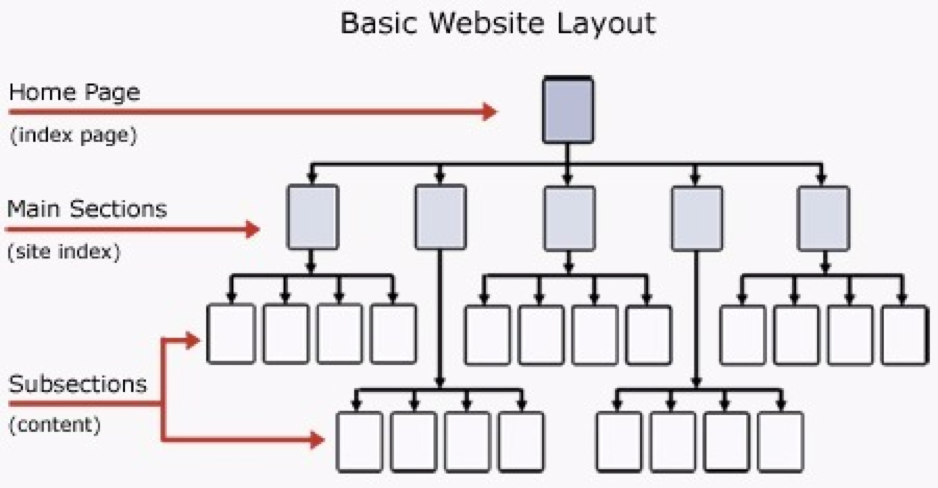Phase One
The basis of an SEO strategy is fairly simple: determine which search terms your potential customers use and which of those terms you want to result in your appearance. Implementing search terms is often complicated and only becomes more complex when you ask this question after your website is live. Of course, it is possible to optimize an existing site and thus achieve good results, but the best option is to get started before your site is live. It is during the planning phase of your website that you have the opportunity to think about what is important to your users, and on which terms you want to be found. In practice, this means you will make a schematic representation of your website, like the one below: Are you a service company? Then think about the different services you provide. Divide the information about these services between different pages, with possibly a layer of sub-services that fall underneath.
Are you a service company? Then think about the different services you provide. Divide the information about these services between different pages, with possibly a layer of sub-services that fall underneath.
Phase Two
Finished with the above action items? Then it’s time for the next step: determine the order of how a visitor navigates your website. The idea of SEO is that you create different pages for the terms you want to be found on, so that each term will automatically be a different entry point. Put yourself in the visitor’s shoes: what does a potential customer need to proceed to an action? Are they looking for testimonials from other customers or other forms of reviews? A list of customers you already work for? Then make sure you have direct links to those pages from your landing page.
But wait a minute…are the terms that I have chosen actually the right ones? You can answer this question by doing keyword research. By examining how many times certain terms are being searched (= search volume), you can determine which terms are most relevant to you. In some cases, small nuances can make a big difference. A useful tool is www.ubersuggest.io, which is used to more easily find related terms. Additionally, the Google Keyword Planner can give you an insight into search volumes; although, it’s results are unfortunately no longer accurate. If you have an SEO tool like MOZ, you can use the keyword explorer tool.
Optimize Pages
Once you have structure and search terms in order, you can take SEO into account by optimizing your future pages and applying your chosen terms in the right places. This is easier than applying to an existing website, where you quickly run into all kinds of issues that need adjustments. For example, having to start with 301 redirects.
Thinking about SEO before your site goes live does not mean that you do not have to think about SEO afterwards. Just like most marketing disciplines, SEO is something you must constantly pay attention to. Especially because the developments within Search are moving faster than ever before. Moreover, your competitors are probably not sitting still either. Need help with SEO? We are happy to work with you!
Learn more about our SEO services here.



